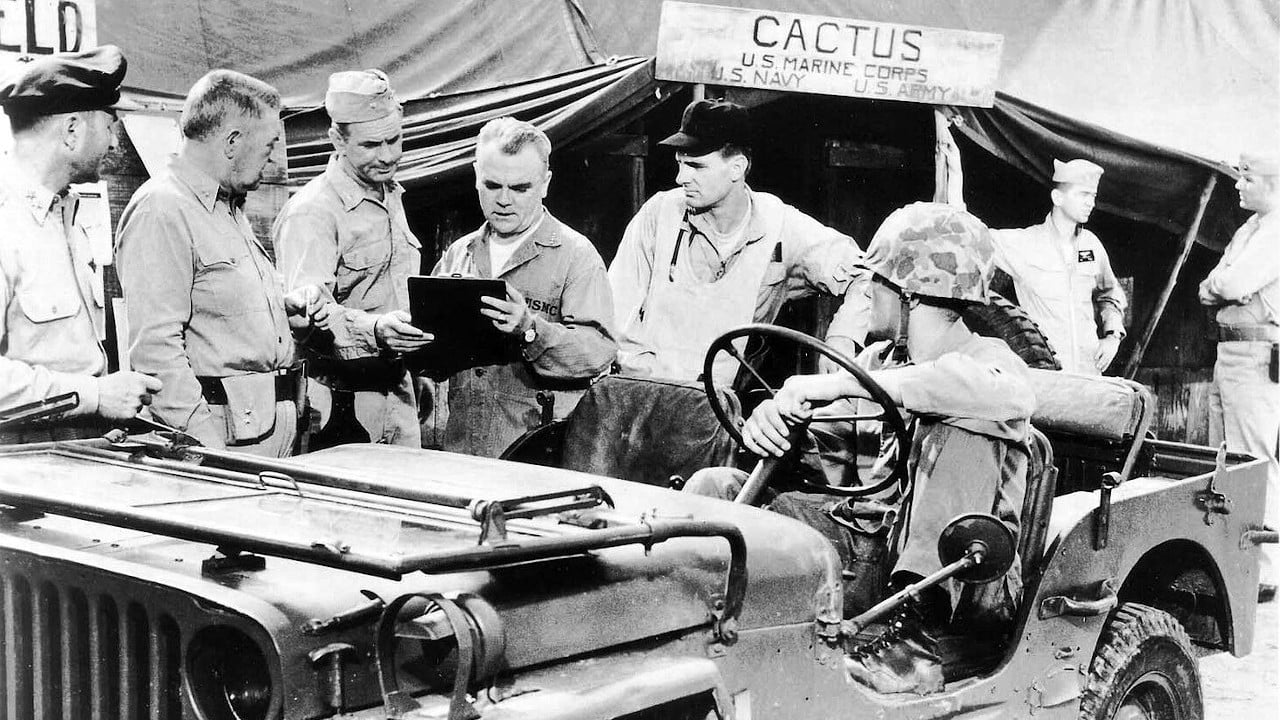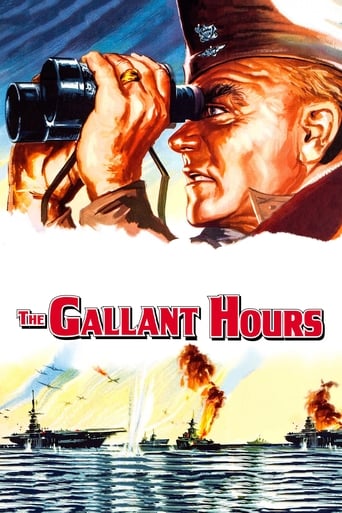Stometer
Save your money for something good and enjoyable
Pacionsbo
Absolutely Fantastic
Philippa
All of these films share one commonality, that being a kind of emotional center that humanizes a cast of monsters.
Chris O'Connor
This movie, produced by Robert Montgomery, a navy veteran of WW2 who acted in the excellent film "They Were Expendable," is a fine story; but it just is not true. It conflates several battles into one, a not too terrible violation of the real history; but then moves the killing of Adm. Yamamoto six months earlier than it actually happened. I love Cagney, and he does well in this film, but it is all in the service of a lie. Watch this film for entertainment, and for the very effective voice-overs when new characters are introduced, describing their civilian careers and their ultimate end: dead, wounded, or survivor. The music is very good, too. STILL, THE MOVIE IS A LIE!!!!!!
utgard14
Docudrama about Admiral William F. Halsey; specifically his experiences during World War II. It's directed and narrated by Robert Montgomery. James Cagney stars and does an excellent job with a quieter, more subtle type of performance than the ones he was known for. Negatives include a slow pace, lack of action, no subtitles when needed, an overuse of devices like narration and background chorus, and Dennis Weaver going full hick accent with his country boy role. Positives include the aforementioned Cagney turn and a sincerity that I can't help but respect. You can tell they (Montgomery, Cagney, et al.) really wanted to make a great film about a man they admired. It's not a movie that I will ever watch again, but I can certainly see the appeal for many others.
foxfirebrand
The question of this movie's lack of action scenes has come up, and the point was made that the movie works as a "tutorial" or history lesson. Well, if that's the case, poetic license goes out the window and the movie must be judged more stringently on one central criterion-- does it get the facts right.As history has sorted things out, serious questions have arisen about Halsey's competence at Guadalcanal, and the consensus seems to be that he was found wanting. The greatest tactical error he made was in falling for a Japanese ruse, and sending his main force on a long chase northward, away from the scene where the actual battle unfolded.I know a movie made in 1960 can't be expected to emphasize a "hero's" shortcomings, but the issue did come up in 1944, and Nimitz seriously considered whether Halsey should remain in command of his battle group. That deliberation was well known, and its omission was a deliberate choice by the movie makers.In 1960 sanitized biographies of war heroes was par for the course-- to take a "warts and all" approach would've distinguished this film and, I believe, made it a better one.
JoeytheBrit
Former actor Robert Montgomery's contemplative account of William Halsey's involvement in the pivotal Guadalcanal campaign is an unusual war film in that it features no battle scenes and no overt heroics. Much of the 'action' takes place in Halsey's office where he holds meetings with his trusted officers to discuss strategy and tactics. The officers are really only there to provide an alternative – i.e. incorrect – point of view so that the wise old admiral can set them straight, which he always does. Even when he briefly considers changing his mind, he shakes his head and dismisses the idea: 'You don't change your mind,' he asserts, 'you go in a different direction.' This is a Cagney-Montgomery co-production, which might account for the decision to dispense with any battle scenes. Presumably, although MGM distributed the picture, they provided no cash for the budget so that the lack of action is a result of financial prudence rather than any artistic or dramatic reasons. The film suffers as a result. It's almost two hours long, which is too long for a war film that contains no scenes of war. Director Montgomery does open up the film a little with Halsey paying a visit on the troops on Guadalcanal, the strategically vital island that must be held at all costs. Not much happens though, other than Halsey leaving all the guys thinking what a swell guy he is.The story is presented in a semi-documentary style with Montgomery providing the narration. It borders on the superfluous at times: we see Japanese commander Yamamoto photographing a flower, and when you condense Montgomery's narration down to the essentials, pretty much what you get is 'Here is Yamamoto photographing a flower.' When Montgomery isn't describing what we're looking at we're treated to some choral music that would be more at home in some movie about the Arthurian legends than a film set on a battle cruiser.James Cagney plays Halsey – who, it has to be said, is practically unknown in the UK – and he's pretty good, which is just as well because he more or less has to carry the picture. Like the talking pictures, Cagney had matured and refined his performances. Age was turning him into rather a stout fellow, and he could no longer get by on jerky, pugnacious energy, so it was necessary for him to adapt, and he was a wholly better actor for it. Others have noted that he toned down his mannerisms for the film, but he'd been playing most of his roles like this for the best part of a decade.Montgomery's direction is pedestrian at best. The storyline doesn't really give him a lot of scope for variety I suppose, and things fall a little flat at times. The script struggles in its attempts to effectively depict the strains and pressures of command while still presenting Halsey as some flawless, super-human strategist. The nearest it ever comes to relating the psychological burden of making decisions that can send hundreds or thousands of men to their deaths is in one quietly affecting scene when Halsey sits alone in his darkened office, his eyes invisible in the shadows beneath his brow, and listens to the sounds of battle around him.Overall, this isn't a bad film. It's not a particularly memorable one either. When I arrived at its page on IMDb to post this review I discovered that I had already rated it – even though I thought I was watching it for the first time. The rating I had given it then was a 4, but I've upped that now to 5. A sign, perhaps, that you need to be of a certain demographic to appreciate this effort.

